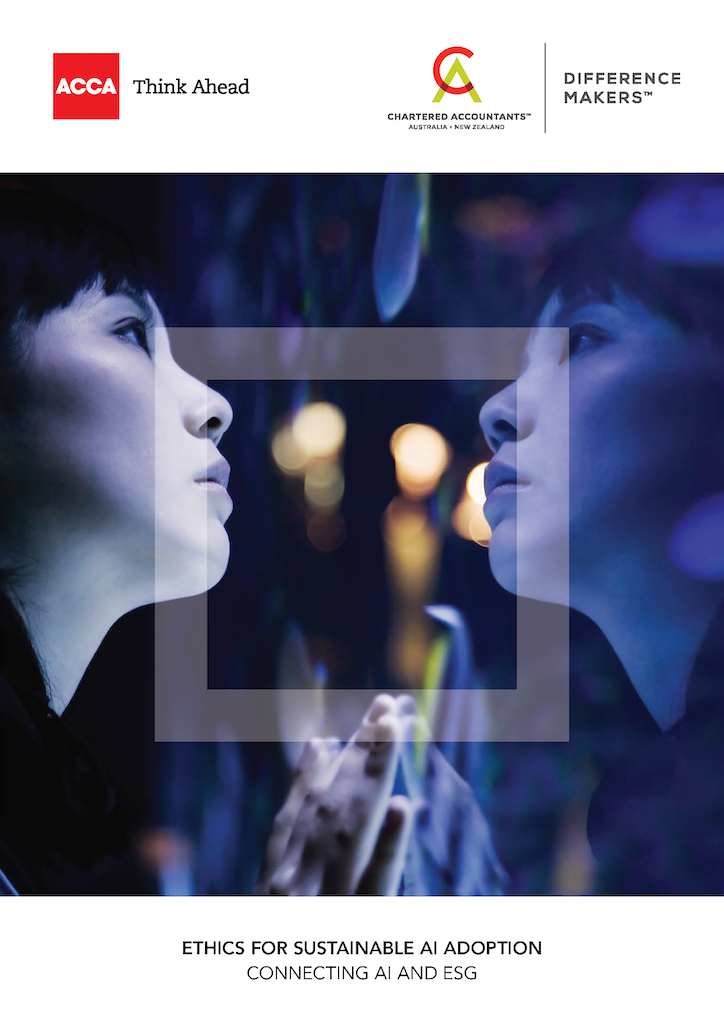While potentially offering tremendous benefit, the broad applicability of AI across society must be handled carefully and professional accountants have a key role to play.
ACCA (the Association of Chartered Certified Accountants) and Chartered Accountants Australia and New Zealand (CA ANZ) reveal in a new report the pressing need for the accountancy profession to make the necessary connections between Artificial Intelligence (AI) and its relationship to environmental, social and governance (ESG) dimensions.
Polling over 5,700 respondents across 21 countries and geographies, the research reveals a cautious tone, with fewer than half (43%) believing that the impact of AI on their rights as an individual is positive – such as safety and personal security, and levels of fairness, choice and transparency.
ACCA and CA ANZ say in Ethics for sustainable AI adoption: Connecting AI and ESG that professional accountants, with their explicit and long-standing commitment to ethical practices, are well placed to guide organisations along a responsible path for AI adoption.
This presents a wake-up call for the accountancy profession to lead the way and become the super connectors needed to ensure an ethical approach. Their management of the transition to mass usage of AI in an ethical, responsible manner is essential if sustainable long-term value is to be secured from it.
The report’s nine recommendations include the need to set tone at the top on AI adoptionby prioritising an approach that is consistent with organisational values such as diversity and inclusion in considering the impact of AI on under-represented groups, or fairness when it comes to recruitment or surveillance of employees; and transparency such as appropriately disclosing AI use to customers.
Another recommendation for the profession is to challenge greenwashing and seek insights from AI tools to help with professional scepticism in examining whether the organisation’s claims about sustainability, such as on achieving net zero targets, are matched by its performance. Suspect claims need to be challenged.
Helen Brand, chief executive of ACCA says:‘AI adoption must consider the needs of all, especially the under-represented and vulnerable in society. That’s why one of our recommendations is to ensure the profession exercises its professional judgement, because AI may create previously unseen situations. We recommend that professional accountants need to avoid over-reliance on simplistic checklist-based approaches which don’t give the full picture or leave space for unintended consequences.’
Ainslie van Onselen, chief executive of CA ANZ adds: ‘Our report found that in order to ethically and sustainably adopt AI, organisations need effective governance mechanisms. This starts with setting the right tone and culture at the top and covers a range of areas from oversight and delivery procedures, to regulation and data governance. AI is a strategic endeavour that should be spearheaded by leaders who know and execute on the difference between what we have a right to do and what is the right thing to do. It’s important to build knowledge and skills at the intersection of AI, ethics and sustainable development. This aligns well to the accountancy profession which can play a key role in driving responsible adoption.’
Key findings from the research amongst accountancy and finance professionals show that:
- 66% believe that their leaders prioritise ethics as highly as profits.
- 64% believe that the impact of AI on overall standard of living in society is positive, but only half that proportion (32%) consider its impact on levels of inequality to be positive. On the latter with 28% recording negative impact, the net positive balance was just 4%.
- Three in four reports being effective / very effective at managing confidentiality, and two in three at managing data quality.
- Just over half (51%) believe that the impact of AI on their ability to live according to their values is positive.31% are aware of AI use within their industry. Fewer than half (48%) have a basic understanding of how an AI algorithm works.
The global accountancy profession is bound by the Code of Ethics (the ‘Code’) and its five fundamental principles as set out by the International Ethics Standards Board for Accountants (IESBA). These are integrity, objectivity, professional competence and due care, confidentiality, and professional behaviour.
Ethics for sustainable AI adoption: Connecting AI and ESG can be downloaded here: https://www.accaglobal.com/gb/en/professional-insights/technology/ai_ethics.html


